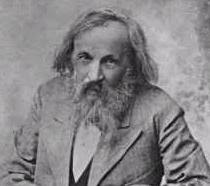Mendeleyev, Dmitry Ivanovich
.
 Mendeleyev, Dmitry Ivanovich (1834-1907), Russian chemist, best known for his development of the periodic law of the properties of the chemical elements. This law states that elements show a periodicity (regular pattern) of properties when they are arranged according to atomic weight.
Mendeleyev, Dmitry Ivanovich (1834-1907), Russian chemist, best known for his development of the periodic law of the properties of the chemical elements. This law states that elements show a periodicity (regular pattern) of properties when they are arranged according to atomic weight.Mendeleyev was born in Tobol’sk, Siberia. He studied chemistry at the University of Saint Petersburg, and in 1859 he was sent to study at the University of Heidelberg. There he met the Italian chemist Stanislao Cannizzaro, whose views on atomic weight (see Atom) influenced his thinking. Mendeleyev returned to Saint Petersburg and became professor of chemistry at the Technical Institute in 1863. He became professor of general chemistry at the University of Saint Petersburg in 1866. Mendeleyev was a renowned teacher, and, because no good textbook in chemistry was available, he wrote the two-volume Principles of Chemistry (1868-1870), which became a classic.
During the writing of this book, Mendeleyev tried to classify the elements according to their chemical properties. In 1869 he published his first version of what became known as the periodic table, in which he demonstrated the periodic law. In 1871 he published an improved version of the periodic table, in which he left gaps for elements that were not yet known. His chart and theories gained increased acceptance when three predicted elements—gallium, germanium, and scandium—were subsequently discovered.
Mendeleyev's investigations also included the study of the chemical theory of solution, the thermal expansion of liquids, and the nature of petroleum. In 1887 he undertook a solo balloon flight to study a solar eclipse.
In 1890 he resigned from the university as a consequence of his progressive political views and his advocacy of social reforms. In 1893 he became director of the Bureau of Weights and Measures in Saint Petersburg and held this position until his death.

Comments